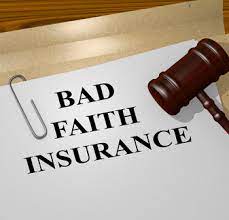
We may not often think of it, but your insurance plan is essentially a contract. When you pay your monthly premiums, you’re upholding your end of that contract. But your insurance provider has just as much responsibility in upholding their end of the bargain and fairly paying out on any valid claims. If they fail to do so, this is referred to as bad faith insurance.
When your insurance company acts in “bad faith,” this means that they either refuse a fair claim, fail to pay its full amount, or otherwise delay or fail to process a fair payment as outlined in your insurance contract. If this does occur, you have options to fight back. Hiring an experienced bad faith insurance attorney can help you receive the fair treatment you deserve and ensure you receive a fair and full payment for your valid claim. Here, we’re taking a closer look at bad faith insurance and looking into some of the most common examples of bad faith insurance so you can determine if you’ve been the victim of this illegal practice.
What is Bad Faith Insurance?
We all need insurance. Both health insurance, auto insurance, and any other type help to protect yourself and your property in the event of an unforeseen accident. Insurance helps to protect you by providing payment for damages or injuries so you can get back to your life. For this coverage, most of us pay monthly premiums so that if an accident ever does arise, our insurance provider will have our backs. Sounds pretty straightforward, right? However, as you’ll soon see, it isn’t always this simple.
In some instances, your insurance provider may not uphold their end of this agreement. When they do so, it’s called bad faith insurance. Your insurance provider might deny a valid claim or simply give you a lowball offer. Either way, this isn’t right. While this may seem shocking to many that your insurer provider would do so, it’s important to remember that they are still for-profit companies at the end of the day? And how do these major providers make their profits? By paying out on as few claims as possible. This is when you may need the support of an experienced bad faith insurance lawyer.
Have I Been the Victim of Bad Faith Insurance Practices?
Let’s face it, insurance contracts are confusing. Unless you’re a professional in the industry, it’s easy to gloss over details and specifics and not exactly understand every aspect of your specific contractual agreement. But even then, it’s still important to understand the exact agreement so you can be aware if your insurance provider upholds their end of the bargain. A bad faith attorney can also help you review your contract to determine whether or not bad faith insurance practices have occurred.
But how do you know in the first place if you really are the victim of bad faith insurance? Just because a claim was denied, this doesn’t mean your provider acted in bad faith. It can be tricky to recognize the difference. Read on to see some of the most common types of bad faith insurance to determine if you’ve been the victim of this practice.
- Denying a valid claim without reason: it’s important to note that your insurance company isn’t always acting in bad faith simply because they deny one of your claims. This happens all the time for valid reasons, which is why you need to know the details of your contract. But if your insurance provider fails to pay out on a valid claim without a good reason, this is one of the most obvious examples of bad faith insurance.
- Providing a lowball offer on a claim: how much is your claim really worth? This can be tricky to know for sure, and in many cases, an insurance company might try to lowball your payment and offer you less than your claim is really worth. Bad faith insurance attorneys can assess the fair value of all your damages and injuries.
- Delaying your claim payment: following an accident, it’s fair to expect prompt payments from your provider so that you can get back to the normal life you love. It may not come overnight, but your provider should act in a timely and reasonable fashion to provide you with payment. If this doesn’t occur, it could be bad faith insurance. Some providers may keep delaying your payment without just cause as a way to get out of payments.
- Failing to conduct a full investigation: you can expect your insurance provider to conduct a thorough and proper investigation of your accident so they can understand all the facts. However, they may fail to conduct a thorough and extensive investigation that will then lead to a denial of your claim.
Conclusion – Am I the Victim of Bad Faith Insurance?
When you’ve experienced an accident, you expect that your insurance provider will be there to assist you and provide the financial support that is outlined in your contract. But sadly, this isn’t always the case. In many instances, insurance providers actually fail to honor valid claims in an attempt to ensure their own profits. But don’t simply sit back and allow this to happen. Fight back against bad faith insurance to get the protection you deserve.
If you think you were the victim of bad faith insurance, contact a local and experienced attorney who specializes in bad faith insurance cases. These legal experts can help you assess your case to first determine if your company even acted in bad faith to begin with. If so, they can help establish your case and fight back to see that you get the justice you deserve. After all, you’ve been faithfully making payments all these years. These attorneys can negotiate on your behalf and see that your insurance provider pays out on any valid claims. Remember: if you’re the victim of bad faith insurance, you’re not alone. Contact a legal expert and see that your insurance provider honors their agreement.
Plug into the legal insights on our Legal Blog; stay informed and contribute your expertise as a top immigration lawyer in the USA by writing for us – be a leader in the legal conversation
